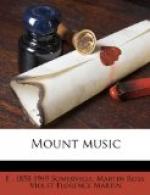With schoolboy roughness he flung his arm round her shoulders. She was a little taller than he, but she did not withdraw herself; she was curiously aware that her point of view was changing. She looked for an instant in his eyes, and then she laid her lips on his.
Larry found, with surprise, that they returned the pressure of his own as he kissed her. The spark that had been in his eyes seemed to have flown to his lips, and met another spark in hers.
There was a moment of silence. Larry found himself a little out of breath, and somehow bewildered. There was more in it than he thought. He didn’t quite know what to do next.
“Thank you very much,” he said, stiffly, and offered his arm.
In silence they walked down the stairs again. The piano had begun, and “Sir Roger de Coverley” was being thundered forth. At the door they met the Doctor. Larry released Tishy’s arm.
“If you don’t mind,” he said to the Doctor, “I think I’ll go up to bed. I’m tired.”
After he had got to his room he shook himself, much as a dog renews its vitality by shaking its ears. Then he poured some water into the basin and washed his hot face, scrubbing his lips with the sponge.
Yet, to his infinite annoyance, he seemed still to feel the pressure of Tishy’s warm mouth on his.
CHAPTER XII
It is, or should be, superfluous to say that Miss Frederica Coppinger viewed with disfavour, that was the more poignant for its helplessness, Larry’s adoption and assimilation by the Mangan family.
“Disastrous!” she said in a tragic voice, to the Rector of Knockceoil parish. “If he were a Protestant it wouldn’t matter so much; but, as things are, for him to be thrown among these second-rate, Nationalistic, Roman Catholics—!”
The intensity of Miss Coppinger’s emotions silenced him. She had indeed beaten her biggest drum, and she knew it.
The Rector, the Reverend Charles Fetherston, nodded his head with solemnity, and made a conscientious effort to remember what she was speaking of. He was not much in the habit of attending to what was said to him, finding his own thoughts more interesting than those of his parishioners. The parishioners, being aware of this peculiarity, put it down, very naturally, to eccentricity for which he was rather to be pitied than condemned, and his popularity was in no way abated by it. Mr. Fetherston was unmarried, in age about sixty; tall, stout, red-faced, of good family, a noted woodcock shot and salmon fisher, a carpenter, and an incessant pipe-smoker. These being his leading gifts, it will probably, and with accuracy, be surmised by persons conversant with the Irish Church, that he was a survival of its earliest days, when it was still an avocation suitable for gentlemen, and one in which they could indulge without any taint of professionalism being laid to their charge.




